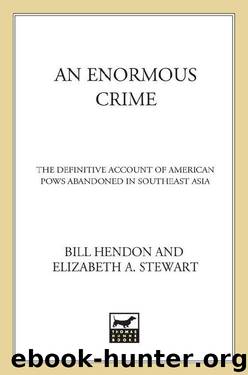An Enormous Crime: The Definitive Account of American POWs Abandoned in Southeast Asia by Bill Hendon & Elizabeth A. Stewart

Author:Bill Hendon & Elizabeth A. Stewart [Hendon, Bill]
Language: eng
Format: epub
Publisher: St. Martin's Press
Published: 2008-10-13T11:00:00+00:00
October 15
THE VOTE ON THE PEROT BILL
Tighe led off the October 15 hearings by testifying that he was even more convinced than he had been in 1981—when he had first testified before the subcommittee that POWs remained alive—that American POWs remained captive in Indochina. “After the passage of five years and review of an almost entirely new, different and convincing set of reports which I recently reviewed,” Tighe declared, “my opinion—my conviction on this issue has not changed, but is reinforced—stronger now, by far, than in 1981.”59
Tighe went on to suggest that the Vietnamese were seeking both reparations and diplomatic recognition in return for the prisoners. “You see evidence in the data base that they consider the economic value of prisoners of war,” Tighe told the subcommittee. “A pilot was worth so much to them in terms of reward. Another type of individual captured was worth so much and so forth … . In my view, the Vietnamese feel strongly that they should get reparations from the United States and feel somehow deprived of that.”60 On the related matter of diplomatic relations, Tighe stated, “I spent 4 years in the South Pacific during World War II. I couldn’t conceive that we would ever have diplomatic relations with Japan, and I drive a new Toyota. I would suggest that the inevitability of at least de facto recognition of the Hanoi government would hasten our ability to resolve this issue, and it is my recommendation that we stop trying to avoid this and try to move it forward to the point where it could be a centerpiece in our resolution of the issue.”61
Perot followed Tighe to the witness table. He began by assuring the subcommittee that “every member of this [Tighe] commission will come in here and under oath say what General Tighe said, only most will say it in much stronger and more colorful language, because General Tighe tends to understatement. So you are not looking at a one man minority position.” Perot then went on to say that he had originally been asked to be a member of the Tighe review panel but his “business schedule” had prevented him from participating. He continued by saying that later, when the commission had finished its work, he had been asked by President Reagan and Vice President Bush to conduct an individual study of the matter. “Both the Vice President and the President wanted me to get to the bottom of this, come to them and tell them what I have found,” Perot said, adding that he was “midflight in that study now.”62
Perot said that one of the two major problems he had uncovered was the fact that, as one senior official had admitted to him, “We set the screen so tight that nothing can get through.”63 The other major problem was the administration’s unwillingness to negotiate for the release of the men. “I have had any number of senior people in our government say, ‘we will never bend, negotiate,’” Perot said, “and
Download
This site does not store any files on its server. We only index and link to content provided by other sites. Please contact the content providers to delete copyright contents if any and email us, we'll remove relevant links or contents immediately.
| Afghan & Iraq Wars | American Civil War |
| American Revolution | Vietnam War |
| World War I | World War II |
Waking Up in Heaven: A True Story of Brokenness, Heaven, and Life Again by McVea Crystal & Tresniowski Alex(37050)
Empire of the Sikhs by Patwant Singh(22215)
We're Going to Need More Wine by Gabrielle Union(18119)
Hans Sturm: A Soldier's Odyssey on the Eastern Front by Gordon Williamson(17077)
Leonardo da Vinci by Walter Isaacson(11964)
The Radium Girls by Kate Moore(10959)
Educated by Tara Westover(7105)
Tools of Titans by Timothy Ferriss(7016)
How to Be a Bawse: A Guide to Conquering Life by Lilly Singh(6734)
The Last Black Unicorn by Tiffany Haddish(5101)
Permanent Record by Edward Snowden(5044)
The Rise and Fall of Senator Joe McCarthy by James Cross Giblin(4864)
Promise Me, Dad by Joe Biden(4489)
The Wind in My Hair by Masih Alinejad(4451)
The Crown by Robert Lacey(4135)
A Higher Loyalty: Truth, Lies, and Leadership by James Comey(4071)
The Iron Duke by The Iron Duke(3674)
Joan of Arc by Mary Gordon(3289)
How to be Champion: My Autobiography by Sarah Millican(3209)
